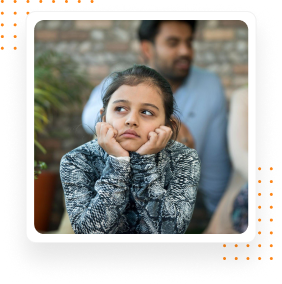What to expect during a child’s therapy session-
The tools your child’s therapist uses will vary, based on your child’s age and the type of therapy being used. In some instances, they may wish to include you in some sessions. This is beneficial for you as well as your child since the therapist can coach you in your interactions with each other.
A good therapist asks questions and listens to the answers. They may encourage your child to talk about what’s bothering them. They may also place strong focus on praising your child, to validate their feelings and build up self-esteem.
In some instances, your child’s therapist may suggest activities to do between sessions, such as keeping a journal, or drawing.
Some therapists, such as cognitive behavioral therapists, may work with your child to master coping skills such as mindfulness meditation or deep breathing. These are beneficial for helping your child feel and stay calm.
How long will a child need therapy for?
+
There’s no cookie-cutter formula that can be used to determine how long your child should stay in therapy. The issues at hand, as well as you and your child’s goals for therapy, will play a role.
Therapeutic changes that lead to happier lives and better behaviors take patience and time. Usually, a therapist will recommend seeing your child once a week for sessions. These may last for several months or longer. In some instances, sessions may be stretched out to once every two weeks.
What type of therapy works best?+
Very young children often benefit most from play therapy techniques, such as child-centered play therapy. Play therapy uses carefully selected toys, games, and other play-centric props to help children work out emotional issues.
Older children may benefit from many therapeutic approaches, including cognitive behavioral therapy (CBT), talk therapy, and child-parent relationship therapy.
How to choose?+
It is important to choose a licensed professional who has experience working with your child’s age group. Based on your child’s age, you may request an interview with the therapist, prior to signing up.
Questions to ask the therapist:
Do you have knowledge or an understanding of my child’s cultural background?
What is your approach to therapy?
What are reasonable goals to expect from therapy?
What is your professional background and therapeutic experience?
How long do you anticipate that my child may need therapy?
Can or should I participate in any sessions?
Do you have availability?
Do you take my insurance?
If not, do you accept patients on a sliding scale?
How do I know if my toddler needs therapy?+
Since toddlers can’t always tell you about traumatic incidents or their needs, it’s important to stay attuned to signs indicating that therapy may be needed. These include regressive behaviors for toilet-trained children, such as bed wetting.
Constant or unusual fits of temper or anger may also be a clue.
If your child suddenly becomes clingy, fearful, or anxious, or displays separation anxiety, they may have experienced trauma and need support.
Regressive use of language, such as reverting back to baby talk, may also indicate need.
Can parents be involved in treatment?+
If you’re a parent, you can have various levels of involvement in your child’s mental health treatment. Whether you’re present during sessions depends on a number of factors, such as the age of your child and what issues they’re working on in treatment.Regardless of whether you sit in on sessions, communicate regularly with the counselor and monitor your child closely between sessions. Share anything you feel is important with your child’s counselor.
Can a minor sign up without parental consent?+
Minors cannot consent to mental health treatment without permission from a parent.
Is the information shared confidential?
+
Yes, patient confidentiality laws apply to online counseling programs for children.
However, some modes of communication, such as Zoom or FaceTime, may not provide a secure or private connection.
In certain situations, confidentiality is limited. Therapists may work with parents to develop ground rules for maintaining a child’s privacy.
When it comes to mandated reporting, counselors and other mental health professionals must report the abuse of minor children to appropriate authorities, regardless of who is the alleged perpetrator. Counselors are also mandated to report if a minor expresses intention to harm themselves or someone else.
Is online counseling right for all kids?+
While online counseling is a great choice for many children, it is not a suitable option for everyone. Some kids respond better to an in-person treatment environment. Additionally, online counseling is not recommended for children or teens who are experiencing suicidal thoughts, self-harming behaviors, or serious behavioral or mental health conditions.

















